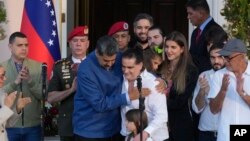The United States has secured the freedom of 10 Americans from Venezuelan prisons in exchange for the release of a close ally of Venezuelan President Nicolas Maduro.
White House national security adviser Jake Sullivan said late Wednesday that the six Americans who were classified as wrongfully detained had safely arrived back in the United States.
That group included Joseph Cristella, Eyvin Hernandez, Jerrel Kenemore, Edgar Jose Marval Moreno, Jason Saad and Savoi Wright.
A senior Biden administration said earlier that the other Americans who were confirmed released and on their way home were not being named at this time "out of consideration for their privacy."
"These individuals have lost far too much precious time with their loved ones, and their families have suffered every day in their absence. I am grateful that their ordeal is finally over, and that these families are being made whole once more," President Joe Biden said in a statement.
The high-stakes swap means clemency and freedom for Alex Saab, a Colombian national and close ally of Maduro, who was indicted by the U.S. Justice Department on eight counts of money laundering in 2019.
"This is a culmination of extraordinary efforts and perseverance across the U.S. government for many, many months to bring these 10 Americans home," a White House official said during a background briefing Wednesday.
As part of the deal, a fugitive named Leonard Francis, known as "Fat Leonard," who fled the United States before he could be sentenced for his lead role in a bribery and corruption case, is being extradited from Venezuela, Biden said.
Saab, 51, was arrested in 2020 when his private plane stopped for refueling in Cape Verde en route from Venezuela to Iran. He was extradited to the U.S. the following year.
He had been indicted in the U.S. in a bribery and low-income housing scheme that siphoned off $350 million from Venezuela and funneled it into banks in Miami, Florida, from 2011 to 2015. He pleaded not guilty to the charges.
Saab was among three individuals targeted by the Treasury Department in 2019 for allegedly enabling Maduro “and his illegitimate regime to corruptly profit from imports of food aid and distribution in Venezuela.”
He had been in custody of the U.S. Bureau of Prisons in Miami.
As part of the prisoner swap, representatives of Maduro’s government have also agreed to release 20 Venezuelan political prisoners. Best known among them is Roberto Abdul, president of civil association Súmate, who was arrested by Venezuela’s intelligence service earlier this month. Abdul is a part of the Maduro opposition in Venezuela.
Maduro also agreed to work toward free and fair conditions for the 2024 presidential election, something Biden commented on in response to a question on Wednesday.
“Looks good, and it looks like Maduro, so far, is keeping his commitment on a free election. But it ain’t done yet. Got a long way to go, but it’s good so far,” Biden said.
The exchange does not change the outstanding U.S. indictment and charges of drug trafficking against Maduro and the $15 million reward from the State Department for help bringing him into custody.
In March 2020, the Justice Department indicted Maduro and 14 co-conspirators for allegedly running a 20-year-long narco-terrorism and cocaine dealing campaign against the U.S. That indictment claims that Maduro has looted billions of dollars from Venezuela and concealed it in South Florida banks.
The United States has limited economic engagement with Venezuela, according to the State Department, because of extensive U.S. sanctions imposed upon the Maduro government for “its extensive corruption, economic mismanagement, and violation of international norms.”
In October, however, the Treasury Department eased some key sanctions against Venezuela, allowing it to make financial transactions in oil, gas, gold and limited Venezuelan sovereign bonds. That agreement also allows some transactions in these sectors for previously blocked Venezuelan banks.
VOA's Jorge Agobian contributed to this report




